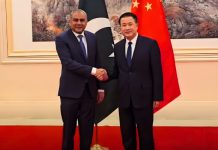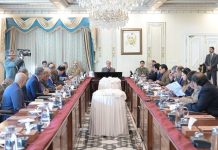-Calls for active partnership to tackle pandemic woes
-Stresses on hunger prevention in developing countries
-Says D8 possess two essential prerequisites for growth: resources & enterprising people
-Presses on creation of new opportunities for youth
By Ajmal Khan Yousafzai
Islamabad: Prime Minister Imran Khan on Thursday called upon member countries of the Developing Eight (D8) grouping to expand the scope of trade between themselves and mobilise resources to tackle the challenge of the Covid-19 pandemic.
He was addressing the 10th virtual summit of the D-8 Organisation for Economic Cooperation, a group that aims to facilitate cooperation in the field of development and counts Bangladesh, Iran, Turkey, Malaysia, Egypt, Indonesia, Nigeria and Pakistan among its members.
The theme of the summit, hosted by Bangladesh, was “Partnership for a Transformative World: Harnessing Power of Youth and Technology”. In his remarks, Prime Minister Imran said the D8 had been formed to “improve member states’ position in the global economy, diversify and create new opportunities in trade relations, enhance participation and decision-making at the international level, and improve living standards”.
He noted that today, the D8 was a grouping of over one billion people with a combined GDP of $4 trillion and “we possess two essential prerequisites for growth: resources and enterprising people”. He proposed the following five-pronged roadmap to “realise the vision of D8 in these testing times”.
• Financial and resource mobilisation:
“We must mobilise financing and resources to recover robustly from the economic and health crisis induced by the Covid pandemic,” Imran said.
He recalled that he had already proposed a five-point plan which included debt relief, creation and redistribution of special drawing rights, mobilisation of climate finance, elimination of illicit financial flows and return of stolen assets to developing countries.
“It was in this context that I called for a global initiative on debt relief last April. I invite the D8 members to consider these five points and join in advocacy of Covid-related relief measures.”
• Expansion of intra-D8 trade: The prime minister suggested that “concrete actions” should be taken to expand trade between the D8 countries from the current $100 billion to $500bn by 2030. “It should include measures like simplification of border procedures, enhancing institutional linkages and operationalising new initiatives. “We welcome ideas like the D8 payment card which will enable transactions in local currency,” he said.
• Youth engagement strategy:
Imran said a strategy to engage the youth of the developing countries through promoting cultural, educational, scientific and business exchanges was very important. He particularly emphasised forming linkages through educational institutions such as scholarships, skill development programmes, trainings, fellowships, joint research, and exchange programmes for the youth, especially in the field of science and technology.
• Knowledge-based economies:
“Technological development is a gateway to economic prosperity particularly in the post-pandemic period when reliance on technology would be greater than ever before in human history,” the prime minister stressed.
“To remain competitive, we must promote knowledge-based economies, increase expenditure on research and development, and focus on rapid digitalisation,” he added, pointing out that Pakistan had recently hosted the inaugural meeting of the D8 network of pioneers of research and innovation.
• Relevance of the D8 in citizens’ lives:
The premier stressed that it was important to make the D8 organisation relevant in the lives of the citizens of its members. This could be achieved, he said, through promoting food security, enhancing cooperation in health, holding joint sports events and helping during natural disasters. “To achieve these goals we need a high level of commitment and mobilisation of financial resources by both developed and developing economies.




